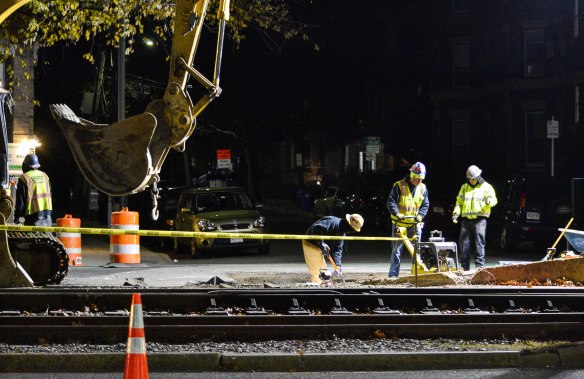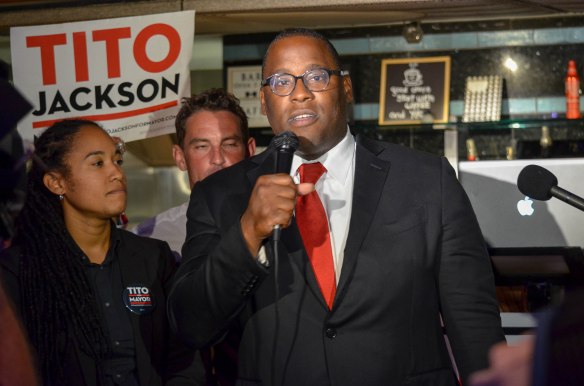
On the Weeki Wachee River in Florida, manatees seek winter warmth near natural springs.


On the Weeki Wachee River in Florida, manatees seek winter warmth near natural springs.
ALLSTON — Boston-based blues punk band Dead Trains may have titled their latest EP “Big Fun,” but the band says the album is anything but what its title implies.
“It’s the black humor that we all sort of share,” Dead Trains bass player Natan Keyes said.
The title comes from a fictional band in the 1980s horror film “Heathers.” The character Martha Dumptruck wears a T-shirt sporting throughout the movie that says “Big Fun,” though throughout the film the character experiences a series of misfortunes.
“I feel like most of our songs, especially in lyrical content, are about being just down and out and f****** screwed over,” drummer Steve Olson said.
The EP is Dead Trains’ fourth released since they formed in 2013. In the past, lead singer and guitarist Matt Axten said he was the sole songwriter for the band and would come to recording sessions with the songs completed. But for “Big Fun,” a lot of the songs came together during the recording process.
“Before, Matt would come with all the stuff — it was written,” Keyes said. Whereas with this one, there was a lot more jamming and we were improvising.”
“It’s a bit of a Frankenstein,” Axten added.
Dead Trains at Great Scott from Laney Ruckstuhl on Vimeo.
The five-track EP is a punk album with clear blues and folk influences — sounding like a loud show in a city basement mixed with a front porch jam in the Appalachian mountains.
“We all come from super diverse musical backgrounds and interest — to the point where we usually can’t agree what to listen to in the car on tour.” Olson said.
“Big Fun” was released on Monday at the Great Scott in Allston. To hear the full EP, click the audio player below.

Construction workers on Commonwealth Avenue burn the midnight oil working on the MBTA’s Green Line in Boston.

(Archived photo): A woman hops off her bicycle to look around Galma Stan, Stockholm in Sweden.
The first thing you notice when you open Breitbart’s website is a giant ad — for their own “iconic” T-shirts. Breitbart has made themselves a brand for being obnoxious trolls to anyone who considers themselves a liberal, or even left-leaning. The next thing you notice is aggressive headlines on the page, such as their lead story which reads “GOP-led Congress ignored plan to ax ‘diversity visa’ used by NYC terror suspect. First of all, Breitbart has a clear right-wing bias, so they focus on painting what the Republican party and President Trump (who some of their main players, like Steve Bannon, have worked closely with in the White House) in a positive light, while everything seen as liberal is painted negatively.
Even if you visited the site not knowing its ties to the Trump administration, you would notice this bias quickly. Other examples of headlines like this: “Very Jake news: CNN’s tapper sez ‘Allahu Akbar’ said ‘under most beautiful of circumstances'” and “Princess Hero: [princess emoji] Ivanka [princess emoji] drops from China trip to rescue tax reform.” It also seems clear that the site is not concerned with appearing outrageous, in fact, they enjoy it. This plays in to their attitude of embracing their role as internet trolls. Their photos even seem biased — photos of Trump and other Republicans look flattering, while photos of people like Democratic leaders and CNN anchors are unflattering and show them looking confused or silly. Overall, Breitbart’s audience is clear, as is their bias and intentions in spinning the news.
Swipe Right is a podcast focusing on love and relationships in the world of technology. Episode one explores a couple who met on Tinder and has been happily dating for six months now.

Carrie Sheehan and Cynthia Fernandez enjoy the last fleeting days of warmth at Revere Beach in mid-October before Autumn’s chill.
The National Anthem Debate on Vimeo.
Football, and the culture surrounding the contact sport, is as American as the national anthem. This season, players and fans alike are questioning their support for the America that football represents. This skepticism is expressed through silent protest of the national anthem.
Many have pointed to the dichotomous treatment of black men in America; professional athletes–a reported 70 percent of NFL players are black men–are canonized, while young black men are criminalized. The National Football League, which once represented American unity, has come to polarize the population in recent months.
Players in the league are kneeling during the national anthem in protest of a celebration of America that expressly excludes some while ignoring many. Conversely, Americans–including President Trump–are protesting the NFL with social media campaigns to #BoycottNFL. The President took to twitter to condemn the silent protest of a growing number of NFL affiliates. He has fallen near silent in the wake of recent violent protests in charlottesville and berkeley. Yesterday, he took to twitter to threaten the protected tax status of the NFL.
The trend, inspired by former 49ers quarterback Colin Kaepernick, spread throughout the league in the 2017 season. In response to police misconduct Kaepernick knelt for the national anthem in his 2016 preseason games. He was not picked up for the 2017 season.
This season, players and then cheerleaders and then coaches and then teams imitated Kaepernick’s silent protest–some in support of his message and some in protest of his absence from the league.
The news media is criticized for inaccurate or insufficient coverage of police brutality; the issue, which is about authority and autonomy, is coming into focus on unconventional channels–music, television, and now sports–and americans are listening. The NFL is gaining interest, some scornful and some celebratory, from Americans who previously tuned the phenomenon out. Public response, which has been plentiful, is split between outrage and support on both sides. Many of those reactions are expressed on twitter but the consequences are significant in the real world.
Conflict in football is typically reserved for on the field skirmishes and fan rivalry off the field. The issue is creating a rift in America where a solid foundation has existed for the last century. The central conflict in question is what is american. Those who kneel in protest of the anthem say that america is failing them and others, those who look down on the protests, say the NFL is failing america.

Matthew Tavares rocks the keyboard during a BADBADNOTGOOD show at the Bowery in Boston. The band is known for their interpretations of hip hop tracks.

Tito Jackson received nearly 30 percent of the vote on Tuesday night during the preliminary election, making him the official challenger to incumbent Martin J. Walsh in the mayoral race.